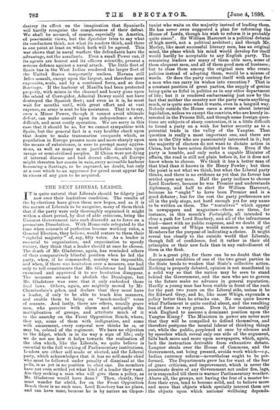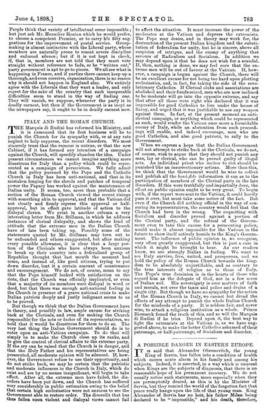THE NEXT LIBERAL LEADER.
IT is quite natural that Liberals should be fidgety just now over their leaderless condition. The results of the by-elections have given them new hopes, and as it is the nature of Liberals to be sanguine, many of them think that if the party were only thoroughly organised it might within a short period, by dint of able criticism, bring the Unionist Government into such discredit as to force on a premature Dissolution. With Home-rule relegated to the time when counsels of perfection become working rules, a General Election, they believe, would restore to them their "rightful majority" of, say, fifty votes. As a leader is essential to organisation, and organisation to speedy victory, they think that a leader should at once be chosen. The death of Mr. Gladstone, again, has reminded others of their comparatively blissful position when he led the party, when, if he commanded, mutiny was impossible, and when, if there was hesitation over a measure, one had only to tell constituents that Mr. Gladstone had himself examined and approved it to see hesitation disappear. 'The measure seemed to abolish the Decalogue, but Mr. Gladstone was sure that it only embodied those final laws. Others, again, are mightily moved by Mr. Chamberlain's gibes, and declare that they must have a leader, if only to be able to teach him manners, and enable them to bring on "much-needed" votes of censure. And lastly, there are others, usually grave men, who perceive with alarm and antipathy the multiplication of groups, and attribute much of it to the anarchy on the Front Opposition Bench, where, they say, some of them with indignation, and some with amusement, every corporal now thinks he is, or may be, colonel of the regiment. We have no objection to the fidget, which is in its way a sign of life ; only we do not see how it helps towards the realisation of the idea which, like the Liberals, we quite believe is essential to the full working of Parliamentary institutions. Leaders are either self-made or elected, and the Liberal party, which acknowledges that it has no self-made chief -who must be followed under penalty of dismissal at the polls, is as yet in no position to elect one. Its members have not even settled yet what kind of a leader they want. Are they seeking a man who will give them a policy, as Gladstone would have done ? Then, clearly, they must wander far afield, for on the Front Opposition Bench there is no such man. Lord Rosebery has no plans, and can have none, because he is by nature an Oppor- tunist who waits on the majority instead of leading them. He has never even suggested a plan for reforming the House of Lords, though his wish to reform it is probably quite sincei'. Sir William Harcourt is a political debater of high merit, not a political architect ; and though Mr. Morley, like most successful literary men, has an original mind, the plans which his mind would develop for itself would hardly be acceptable to any English party. The remaining leaders are many of them able men, some of them eloquent men, and all of them good men of business; but to class them among the original men who create policies instead of adopting them, would be a misuse of words. Or does the party content itself with seeking for a man who can carry its wishes into execution ? That is a constant position of great parties, the supply of genius being quite as fitful in politics as in any other department of life ; but it is rendered embarrassing just now by the fact that neither the country nor the party wants anything much, or is quite sure what it wants, even in a languid way. Nobody outside the House cares a straw about internal legislation, unless we except the convicts, who are keenly in- terested in the Prisons Bill, and though some foreign ques- tions are subjects of sharp contention, it is a little difficult to found a party on a wish for better security as to a potential trade in the valley of the Yangtse. That question is really a most important one, and there are men in the City who are passionately interested in it; but the majority of electors do not want to dictate action in China, but to have action dictated to them. Even if the party is humble, and only seeks a capable Minister of affairs, the road is still not plain before it, for it does not know whom to choose. We think it has a better man of that kind than it knows in Sir Henry Fowler ; but then the point is not what we think, but what the Liberal party thinks, and there is no evidence as yet that its favour has settled upon any man. Half the party inclines to choose Lord Rosebery, because he was Premier and understands diplomacy, and half to elect Sir William Harcourt, because he " ought " to have been Premier and is a good debater ; but for the rest the party preferences are all in the pulp stage, not hard enough yet for any name to be written on them. The " tentatives " which appear in newspapers and magazines—there are three, for instance, in this month's Fortnightly, all intended to clear a path for Lord Rosebery, and all of the infructuous kind—meet with no public response, and we doubt if the most sanguine of Whips would summon a meeting of Members for the purpose of indicating a choice. It might reveal too clearly to the outside world that Liberals, though full of confidence, feel it rather in their old principles or their new fads than in any embodiment of them in the flesh.
It is a great pity, for there can be no doubt that the disorganised condition of one of the two great parties in the State tends to weaken that State's collective action. Nothing is properly debated, opinion is not manifested in a solid way so that the nation may be seen to stand behind the Government, and the men who are to govern in the future make no advance in general reputation. Hardly a young man has been visible in front of the ruck for the past two years on the Liberal side, unless it be Sir Edward Grey, and he, like most Whigs, expounds a policy better than he attacks one. No one quite knows what Parliament is quite cordial about, and the resulting loss of force is very great. Does it, for instance, really wish England to assume a dominant position upon the Yangtse Kiang ? The Ministers in power are never sure that they will be compelled to defend themselves, and therefore postpone the mental labour of thinking things out, while the public, perplexed at once by silences and by speeches which reveal only one side of the argument, falls back more and more upon newspapers, which, again, lack the instruction derivable from exhaustive debate. Languorsteals over the House of Commons, and the Government, net being pressed, avoids work which—e.g., Indian currency reform—nevertheless ought to be per- formed. The Departments grow lax for want of the fear of grave criticism, and improvement, which is never the passionate desire of any Government not under fire, lags, or is suspended till there is warmer Parliamentary weather. Above all, the groups, not having the fear of a master be- fore their eyes, tend to become solid, and to believe more and more that objects which specially interest them are the objects upon which national wellbeing depends. People think that variety of intellectual error impossible ; but just ask Mr. Henniker Heaton which he would prefer, to choose a competent Premier, or to carry lin fifty sug- gestions for the improvement of postal service. Group. making is almost instinctive with the Liberal party, whose members are naturally prone to resent severe discipline and enforced silence ; but if it is not kept in check, if, that is, members are not told that they must vote straight without reference to fads, or be "written out," party government is apt to go to pieces. We all see what is happening in France, and if parties there cannot keep up a thorough, and even coercive, organisation, there is no reason why it should not happen in England also. We entirely agree with the Liberals that they want a leader, and only regret for the sake of the country that such insuperable difficulties seem to stand in the way of finding one. They will vanish, we suppose, whenever the party is in deadly earnest, but then if the Government is as inept as the newspapers say, it ought to be in deadly earnest now.



































 Previous page
Previous page